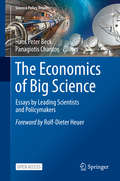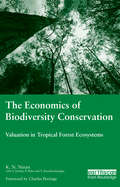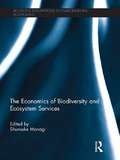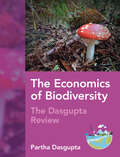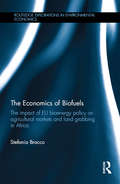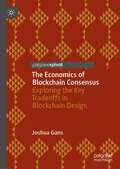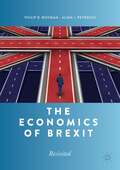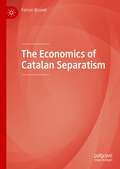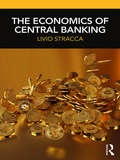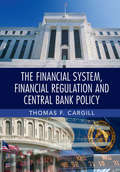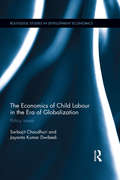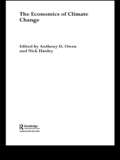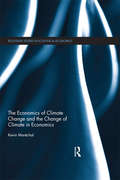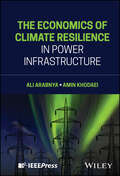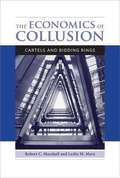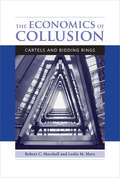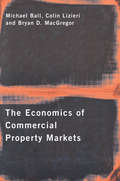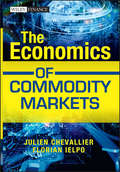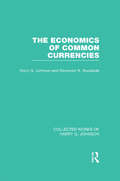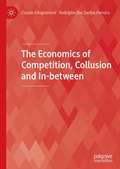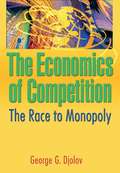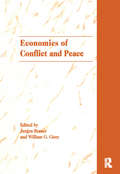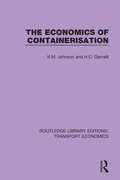- Table View
- List View
The Economics of Big Science: Essays by Leading Scientists and Policymakers (Science Policy Reports)
by Hans Peter Beck Panagiotis CharitosThe essays in this open access volume identify the key ingredients for success in capitalizing on public investments in scientific projects and the development of large-scale research infrastructures.Investment in science – whether in education and training or through public funding for developing new research tools and technologies – is a crucial priority. Authors from big research laboratories/organizations, funding agencies and academia discuss how investing in science can produce societal benefits as well as identifying future challenges for scientists and policy makers. The volume cites different ways to assess the socio-economic impact of Research Infrastructures and their role as hubs of global collaboration, creativity and innovation. It highlights the different benefits stemming from fundamental research at the local, national and global level, while also inviting us to rethink the notion of “benefit” in the 21st century.Public investment is required to maintain the pace of technological and scientific advancements over the next decades. Far from advocating a radical transformation and massive expansion in funding, the authors suggest ways for maintaining a strong foundation of science and research to ensure that we continue to benefit from the outputs. The volume draws inspiration from the first “Economics of Big Science” workshop, held in Brussels in 2019 with the aim of creating a new space for dialogue and interaction between representatives of Big Science organizations, policy makers and academia. It aspires to provide useful reading for policy makers, scientists and students of science, who are increasingly called upon to explain the value of fundamental research and adopt the language and logic of economics when engaging in policy discussions.
The Economics of Biodiversity Conservation: Valuation in Tropical Forest Ecosystems
by K.N NinanEconomic valuation of biodiversity and ecosystem services is possibly the most powerful tool for halting the loss of biodiversity while maintaining incomes and livelihoods. Yet rarely have such approaches been applied to tropical forest ?hotspots?, which house the vast majority of the planets plant and animal species. This ground-breaking work is the most comprehensive and detailed examination of the economics of environmental valuation and biodiversity conservation to date. Focusing on the Western Ghats of India, one of the top biodiversity hotspots in the world, this volume looks at a cross-section of local communities living within or near sanctuaries and reserve forests such as coffee growers, indigenous people and farmers-cum-pastoralists to assess the use and non-use values that people derive from tropical forests. It also looks at the extent of their dependence on forests for various goods and services, and examines their perceptions and attitudes towards biodiversity conservation and wildlife protection. The book concludes with an assessment of the institutional alternatives and policies for promoting biodiversity conservation through economic valuation methods. Related titles Economics for Collaborative Environmental Management (2005) 1-84407-095-6
The Economics of Biodiversity and Ecosystem Services (Routledge Explorations In Environmental Economics Ser.)
by Shunsuke ManagiEcosystems and biodiversity have been degraded over decades due to human activities. One of the critical causes is market failure: the current market only accounts tangible resources and neglects intangible functions, such as climate control and natural hazard mitigation. Under such circumstances in capitalism, land conversion and resource exploitation, which generate financial income, are highly prioritised over conservation, which is not necessarily beneficial in monetary terms. To halt ecosystem degradation, thus, the values of ecosystem services need to be visualised and economic instruments for ecosystem conservation should be further developed. This book focuses on these two aspects and performs several studies, including valuation of ecosystem services, productivity analysis, institutional design of payment for ecosystem services (PES), impact assessment of reduction emission from deforestation and forest degradation (REDD), and economic experiment of mitigation banking scheme. From these analysis, economic values of ecosystem services are demonstrated from both supply and demand side, and the directions for improving economic instruments are indicated both directly and indirectly. As many of these analysis are usually conducted in the North America and Europe, this book is unique in geographical focus, namely, Japan, Asia and globe. Also, wide variety of ecosystems are targeted for studies; agricultural lands, forests, wetlands, and marine. Hence, this will be informative introduction for those who desire to study economics of biodiversity and ecosystem services in these regions and of these ecological zones.
The Economics of Biodiversity: The Dasgupta Review
by Partha DasguptaWe are part of Nature, not separate from it. We rely on Nature to provide us with food, water and shelter; regulate our climate and disease; maintain nutrient cycles and oxygen production; and provide us with spiritual fulfilment and opportunities for recreation and recuperation, which can enhance our health and well-being. Nature's constituents such as ecosystems and the biodiversity that are embodied in them are therefore assets. Yet Nature is more than an economic good: many recognise its intrinsic worth and argue that it has moral worth too. This landmark report explains the current state of play in relation to biodiversity loss and outlines a sustainable path to deal with this problem, one that will require us to change how we think, act and measure success. The report was originally commissioned and published by HM Treasury. This title is also available as Open Access on Cambridge Core.
The Economics of Biofuels: The impact of EU bioenergy policy on agricultural markets and land grabbing in Africa (Routledge Explorations in Environmental Economics)
by Stefania BraccoBiofuels are a renewable source of energy used mainly for transportation. They link together food, energy and natural resources sectors, and involve ecological, social and inequality issues. They are an emblematic example of the interactions between economic, environmental, social and political decisions and, as a recent and complex issue, require updated and detailed information to be understood. This book aims to shed light on several economic, social and environmental issues connected to biofuel production and policies. The Economics of Biofuels adopts detailed descriptions, rigorous data analysis and precise econometric methods to estimate the effects of biofuel on different socio-economic factors, avoiding complicated and sometimes ineffective models based on context-specific parameters. In particular, the book focuses on the impact of bioenergy policy on biocommodity production and trade, and on the related phenomenon of land acquisitions to grow biofuel commodities. The book’s main findings are derived by an original and unique dataset collecting information on the investors acquiring land in Africa and on the voluntary standard, certification and labelling schemes adopted by them as Corporate Social Responsibility (CSR) strategy. The analysis links together in an original way public and private initiatives to make biofuel sustainable. Therefore, this book represents an improvement in the understanding of biofuel production and policy’s sustainability. This book is of interest to those who study environmental economics, agricultural economics and sustainable development. It is also suitable for those in the renewable energy sector, with a particular focus on biofuel sustainability.
The Economics of Blockchain Consensus: Exploring the Key Tradeoffs in Blockchain Design
by Joshua GansBlockchain technologies have been rapidly adopted for the creation of cryptocurrencies and have been explored for a myriad of applications. While this is of important economic interest, the computer science behind how blockchains operate to provide security and provenance has been largely inaccessible to economists. This book is a bridge between the computer science and the economics of blockchains. The focus is on the value and the achievement of blockchain consensus; that is, how distributed and independent nodes are able to reach an agreement on what the current state of digital ledgers, that are the product of blockchains, are. The book shows that the goals of computer scientists in designing blockchains place very high weight on security beyond what an economist trained in game theory and mechanism design would require. It shows how blockchains can be redesigned to account for key economic trade-offs, and will be of interest to researchers and students of economics, financial technology and computer science, alongside policymakers.
The Economics of Brexit: Revisited
by Philip B. Whyman Alina I. PetrescuThe Economics of Brexit – Revisited builds upon and extends the analysis contained within the authors' previous book, The Economics of Brexit: A Cost-Benefit Analysis of the UK's Economic Relationship with the EU, which arguably represented the most comprehensive and systematic evaluation of the UK’s economic relationship with the EU. The Economics of Brexit – Revisited continues where the previous volume left off, given that the UK has now formally withdrawn from the EU, and therefore the focus of the evidence presented concerns the potential economic implications arising from Brexit and considering the options available to those negotiating the UK's future economic relationship both regionally and globally. The Economics of Brexit – Revisited seeks to provide greater clarity to a range of issues that have been hotly debated over the past few years, ranging from the trade and fiscal implications of Brexit, to the economic impact of regulation and migration. The significance of different Brexit options are discussed in detail, including the significance of demands for regulatory harmonisation (the 'level playing field'), along with their implications for UK trade with the EU and the rest of the world. A wide range of economic analyses are evaluated to determine their relative methodological strengths and weaknesses, and ultimately whether their conclusions are sufficiently robust to engender confidence. Finally, noting that a key determinant of the effectiveness of any post-Brexit economic strategy depends upon the degree of flexibility created for economic policy, the book provides an extended examination of the potential relating to different economic policy options available to the UK government, depending upon the form of final trade settlement that is agreed with the EU. These policy options include more active forms of macroeconomic management, combined with industrial and procurement policy. The Economics of Brexit – Revisited therefore seeks to combine evaluation of the available evidence indicating the economic impact of Brexit, together with consideration of policy trade-offs that lie at the heart of the choices surrounding Brexit, and how these might be resolved.The Economics of Brexit – Revisited therefore maintains its position as the most comprehensive analysis of the economics of Brexit in the market today.
The Economics of Catalan Separatism
by Ferran BrunetThis book analyses the economic consequences of the regional government of Catalonia's challenge to democracy and the rule of law in Spain. This process, started in 2010, culminated in a coup d'état in the autumn of 2017. The book has three parts. First: The circumstances behind the challenge: economic structure, social and political aspects. Second: The economic impacts of the resulting huge political instability and social polarisation, and the downturn in GDP, investment, competitiveness, Barcelona's appeal, and flight of companies and banks to Madrid. Third: Independence would mean collapse of trade with the rest of Spain and the EU, expulsion from the eurozone, fall of GDP, plummeting tax revenue, soaring unemployment and, finally, conversion of this hypothetical new Catalonia into a failed, vassal and totalitarian state. This book is destined to be the foremost work of reference on the consequences of the separatist threat to Spain, including Catalonia's current decline.
The Economics of Central Banking
by Livio StraccaThis book offers a comprehensive analysis of central banks, and aims to demystify them for the general public, which is the only way to have a rational debate about them and ultimately to make them truly accountable. The book originates from the author’s graduate lectures on Central Banking at the University of Frankfurt J.W. Goethe. It contains an overview of all the key questions surrounding central banks and their role in the economy. It leads the reader from the more established concepts (including monetary theory and historical experience), necessary to have a good grasp of modern central banking, to the more open and problematic questions, which are being debated within academic and financial market circles. This structure enables readers without specific knowledge of central banks or monetary economics to understand the current challenges. The book has three defining characteristics, which set it apart from competing titles: first, it is pitched at the general public and uses simple and entertaining language. Second, it is rooted in, and makes frequent reference to, recent academic research, based on content for a graduate level course. Third, the author thinks 'out of the box' in order to describe the possible evolution of central banks (including the prospect of their disappearance), and not only the status quo.
The Economics of Central Banking, Financial Policy and Institutions
by Thomas F. CargillTraditional money and banking textbooks are long, expensive, and full of so much institutional and technical modeling detail that students cannot understand the big picture. Thomas F. Cargill presents a new alternative: a short, inexpensive book without the 'bells and whistles' that teaches students the fundamentals in a clear, narrative form. In an engaging writing style, Cargill explains the three core components of money and banking, and their interactions: 1) the financial system, 2) government regulation and supervision, and 3) central bank policy. Cargill focuses on the interaction between government financial policy and central bank policy and offers a critique of the central bank's role in the economy, the tools it uses, how these tools affect the economy, and how effective these policies have been, providing a more balanced perspective of government policy failure versus market failure than traditional textbooks.
The Economics of Centralism and Local Autonomy
by Phillip J. BrysonA comparative analysis of the process of public sector transition from central planning to market democracy. It is the story of the difficulties and complexities of moving to a system of greater autonomy for the subnational governments of the Czech and Slovak Republics, including the future of fiscal policies after the global recession.
The Economics of Child Labour in the Era of Globalization: Policy issues (Routledge Studies in Development Economics)
by Sarbajit Chaudhuri Jayanta Kumar DwibediChildren in poor countries are subjected to exploitation characterized by low wages and long hours of work, as well as by unclean, unhygienic and unsafe working and living conditions, and, more importantly, by deprivation from education, all of which hampers their physical and mental development. Child labour is a complex issue, and clearly it has no simple solution. This book sheds some understanding of its root causes. The book attempts to delve into many of the important theoretical aspects of child labour and suggests policies that could indeed be useful in dealing with the problem under diverse situations using alternative multisector general equilibrium models.
The Economics of Climate Change (Routledge Explorations In Environmental Economics Ser. #Vol. 3)
by Nick Hanley Anthony D OwenThis impressive new collection couldn't come at a better time. With global warming now becoming physically noticeable and the Kyoto treaty stalling in its efforts to get the developed world on board, a look at the economic factors of global warming is very much welcome. With contributions from distinguished authors and covering everything you need
The Economics of Climate Change and the Change of Climate in Economics
by Kevin MaréchalClimate change is without question the single most important issue the world faces over the next hundred years. The most recent scientific data have led to the conclusion that the globally averaged net effect of human activities since 1750 has been one of warming and that continued greenhouse gas emissions at or above current rates would cause this process to continue to the severe detriment of our environment. This unequivocal link between climate change and human activity requires an urgent, world-wide shift towards a low carbon economy and coordinated policies and measures to manage this transition. The starting point and core idea of this book is the long-held observation that thethreat of climate change calls for a change of climate in economics. Inherent characteristics of the climate problem including complexity, irreversibility and deep uncertainty challenge core economic assumptions and mainstream economic theory appears inappropriately equipped to deal with this crucial issue. Kevin Maréchal shows how themes and approaches from evolutionary and ecological economics can be united to provide a theoretical framework that is better suited to tackle the problem.
The Economics of Climate Resilience in Power Infrastructure
by Amin Khodaei Ali ArabnyaFull-scope economic perspectives on planning, operations management, and maintenance of climate resilience building measures in power infrastructure The Economics of Climate Resilience in Power Infrastructure sheds light on the engineering economics of climate adaptation in electric power infrastructure by covering the relevant decision-making processes involved in managing risk and resilience in these systems. The book offers a system-level perspective along with detailed modeling of the most pressing resilience issues, while also providing detailed numerical examples on small test systems throughout the text to help readers see the outcomes of models. The book starts with an introduction to risk management and the techno-economic considerations for resilience building measures in power systems. Next, economic concepts and mechanisms for managing climate risk in power systems are introduced. Afterward, an economic model for resilience investment in these systems against climate shocks is presented. The authors then discuss an economic asset management model for long-term resilience building in critical infrastructure assets. Subsequently, an economic model for operations management during disasters is proposed, followed by a model for post-disaster restoration. Written by a pair of distinguished thought leaders, the book explores other topics such as: Microgrid applications for decentralization, along with an economic model for resilience-oriented microgrid operations A deep defense framework for climate risk management in power systems, along with other factors influencing their operational and financial resilience Essential climate risk financing mechanisms and techno-economic factors in managing risk and resilience in the face of wildfires, heat waves, and hurricanes Steps for utility and infrastructure owners to recover from climate shocks and natural disasters, for the benefit of shareholders, ratepayers, and policymakers The Economics of Climate Resilience in Power Infrastructure is an essential resource on the subject for industry practitioners, R&D engineers, infrastructure planners, and graduate students seeking to incorporate the economics of resilience with engineering solutions to streamline the success of climate adaptation measures in the power and energy industry.
The Economics of Collusion
by Robert C. Marshall Leslie M. MarxExplicit collusion is an agreement among competitors to suppress rivalry that relies on interfirm communication and/or transfers. Rivalry between competitors erodes profits; the suppression of rivalry through collusion is one avenue by which firms can enhance profits. Many cartels and bidding rings function for years in a stable and peaceful manner despite the illegality of their agreements and incentives for deviation by their members. In The Economics of Collusion, Robert Marshall and Leslie Marx offer an examination of collusive behavior: what it is, why it is profitable, how it is implemented, and how it might be detected. Marshall and Marx, who have studied collusion extensively for two decades, begin with three narratives: the organization and implementation of a cartel, the organization and implementation of a bidding ring, and a parent company's efforts to detect collusion by its divisions. These accounts--fictitious, but rooted in the inner workings and details from actual cases--offer a novel and engaging way for the reader to understand the basics of collusive behavior. The narratives are followed by detailed economic analyses of cartels, bidding rings, and detection. The narratives offer an engaging entrée to the more rigorous economic discussion that follows. The book is accessible to any reader who understands basic economic reasoning. Mathematical material is flagged with asterisks.
The Economics of Collusion: Cartels and Bidding Rings
by Robert C. Marshall Leslie M. MarxAn examination of collusive behavior: what it is, why it is profitable, how it is implemented, and how it might be detected.Explicit collusion is an agreement among competitors to suppress rivalry that relies on interfirm communication and/or transfers. Rivalry between competitors erodes profits; the suppression of rivalry through collusion is one avenue by which firms can enhance profits. Many cartels and bidding rings function for years in a stable and peaceful manner despite the illegality of their agreements and incentives for deviation by their members. In The Economics of Collusion, Robert Marshall and Leslie Marx offer an examination of collusive behavior: what it is, why it is profitable, how it is implemented, and how it might be detected.Marshall and Marx, who have studied collusion extensively for two decades, begin with three narratives: the organization and implementation of a cartel, the organization and implementation of a bidding ring, and a parent company's efforts to detect collusion by its divisions. These accounts—fictitious, but rooted in the inner workings and details from actual cases—offer a novel and engaging way for the reader to understand the basics of collusive behavior. The narratives are followed by detailed economic analyses of cartels, bidding rings, and detection.The narratives offer an engaging entrée to the more rigorous economic discussion that follows. The book is accessible to any reader who understands basic economic reasoning. Mathematical material is flagged with asterisks.
The Economics of Commercial Property Markets
by Michael Ball Colin Lizieri Bryan MacGregorThis new text provides a rigorous analysis of real estate markets. Three main sections cover: microeconomics of property markets the macroeconomics of commercial property the financial economics of property Global empirical examples illustrate the theories and issues. This often complex area is made accessible: each chapter contains a boxed summary and questions for self-testing or discussion.
The Economics of Commodity Markets
by Julien Chevallier Florian IelpoAs commodity markets have continued their expansion an extensive and complex financial industry has developed to service them. This industry includes hundreds of participating firms, including asset managers, brokers, consultants, verification agencies and a myriad of other institutions. Universities and other training institutions have responded to this rapid expansion of commodity markets as well as their substantial future growth potential by launching specialized courses on the subject. The Economics of Commodity Markets attempts to bridge the gap between academics and working professionals by way of a textbook that is both theoretically informative and practical. Based in part on the authors' teaching experience of commodity finance at the University Paris Dauphine, the book covers all important commodity markets topics and includes coverage of recent topics such as financial applications and intuitive economic reasoning. The book is composed of three parts that cover: commodity market dynamics, commodities and the business cycle, and commodities and fundamental value. The key original approach to the subject matter lies in a shift away from the descriptive to the econometric analysis of commodity markets. Information on market trends of commodities is presented in the first part, with a strong emphasis on the quantitative treatment of that information in the remaining two parts of the book. Readers are provided with a clear and succinct exposition of up-to-date financial economic and econometric methods as these apply to commodity markets. In addition a number of useful empirical applications are introduced and discussed. This book is a self-contained offering, discussing all key methods and insights without descending into superfluous technicalities. All explanations are structured in an accessible manner, permitting any reader with a basic understanding of mathematics and finance to work their way through all parts of the book without having to resort to external sources.
The Economics of Common Currencies: Proceedings of the Madrid Conference on Optimum Currency Areas (Collected Works of Harry G. Johnson)
by Robert A. MundellGathering together the papers presented at the Madrid Conference on Optimum Currency Areas in 1970 this volume represents one of the first complete surveys of the theory and policy implication of monetary integration. The book discusses: the economics of fixed exchange rates relevant to monetary relations within an integrated monetary area the evolution of economic doctrine and a survey of optimum currency area theory problems of policy co-ordination within a currency area relevance of the monetary-fiscal policy mix problems of monetary union in developing countries the book predicted the establishment of an European currency but presented the case for greater flexibility of exchange rates as an alternative to currency unification.
The Economics of Competition, Collusion and In-between
by Claude d’Aspremont Rodolphe Dos Santos FerreiraThis book provides a methodology for the analysis of oligopolistic markets from an equilibrium viewpoint, considering competition within and between groups of firms. It proposes a well-founded measure of competitive toughness that can be used in empirically relevant applications. This measure reflects the weight put by each firm on competition for market share relative to competition for market size – two dimensions of competition involving conflicting and convergent interests, respectively. It further explores several applications, such as the effect of tougher competition on innovation and of output market power on the emergence of involuntary unemployment, as well as the importance of strategic interactions for investment decisions. Relative to the dominant model of monopolistic competition, The Economics of Competition, Collusion and In-between aims to explore an alternative tractable model of firm competition opening the application of oligopoly theory to many fields in economics where general equilibrium features are crucial. It will be relevant to those interested in applied industrial organization, trade, macroeconomics (in particular macrodynamics) and quantitative economics.
The Economics of Competition: The Race to Monopoly
by George G DjolovA comprehensive examination of the ways competition and innovations level the playing field in the free marketThe Economics of Competition uses the South African pharmaceutical industry as a case study to cogently challenge accepted economic and regulatory views on competition and monopoly, then re-establishes and emphasizes the importance of foundational economic principles. The book comprehensively explores the concept that monopoly is self-limiting within unrestricted competition, as well as the various market features of competition, innovation, and market power. This detailed examination broadens understanding of the economics of competition for both scholars and practitioners.Competition is seen as a continuous process in a free market. The Economics of Competition thoughtfully explores the competitive process in its two mechanisms, the transfer of market share from one rival to another, and innovation of a new product, new method of production, new market opening, or new source of supply of raw materials. The dynamic nature of the marketplace is thoroughly examined from the author's inside view of the South African pharmaceutical industry. This provides a rare opportunity to closely examine an industry considered to be a monopoly while actively applying economic theories of competition and freedom of choice. The effects of public policy, legislation, and pricing regulations are discussed in detail. The book has several tables and figures to enhance clarity and is extensively referenced.The Economics of Competition discusses:* monopoly and rivalry in the free market* theories of perfect competition* innovation as a controlling variable* pricing and price differentiation* barriers to competition-including historical and contemporary legislative barriers * horizontal mergers and acquisitions as a key aspect of market power* and more!The Economics of Competition is insightful, thought-provoking reading for policymakers as well as anyone practising antitrust law, microeconomics, industrial economics, managerial economics, marketing strategy, theoretical public health, and students and educators of marketing and economics.
The Economics of Conflict and Peace: Economic, Legal, And Political Perspectives (Contributions To Conflict Management, Peace Economics And Development Ser.)
by Jurgen Brauer William G. GissyThis work addresses new directions in research on the economic theory of conflict, the cost of war, and the benefits of peace. A collection of 17 papers drawing on contributors from all continents, the volume is divided into four sections. The first discusses novel ways to think about the economics of conflict and peace from theory perspectives. These include discussions of conflict from the perspectives of standard neoclassical analysis and economic geography. An especially interesting paper in this section addresses conflict in the context of the emerging theory of international public finance. A second section deals with military expenditures, economic/human development and economic growth in the US and developing nations of Asia and Africa. The volume enters new territory in sections three and four. Section three contains a set of papers on the economic cost of war and war’s aftermath, significantly expanding economists’ rather modest efforts to date. Section four is concerned with how the concepts of economics might be operationalized and institutionalized to foster security.
The Economics of Conflict and Peace: History and Applications (Elements in Defence Economics)
by Jurgen Brauer Christopher J. Coyne Charles H. Anderton Shikha Basnet Silwal J. Paul DunneWritten for an audience of students, general readers, and economists alike, this Element is a primer on the field of the economics of conflict and peace. It offers a reasonably comprehensive, systematic, and detailed overview - even if in broad strokes - of the field's orthodox and heterodox history of thought and current theories and evidence. The authors view this Element as a baseline account on which to build a future, separate and more fully developed, work on the economics of peace, economic growth, and human development. Altogether, the Element contextualizes the field of conflict and peace economics, outlines its history of thought, highlights examples of current theoretical and empirical scholarship in the field, and maps trajectories for further research.
The Economics of Containerisation (Routledge Library Editions: Transport Economics #8)
by K.M. Johnson H.C. GarnettThis book, first published in 1971, was the first comprehensive study based upon experience gained by operators and users of containers, both inland and for overseas trade. The book is concerned with the technical innovation of container use, the economics of their usage, the influence of government on distribution and transport, and on port development.
